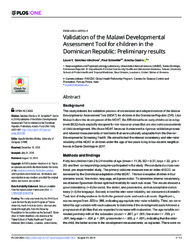Please use this identifier to cite or link to this item:
http://cris.unibe.edu.do/handle/123456789/19| DC Field | Value | Language |
|---|---|---|
| dc.contributor.author | Sánchez-Vincitore, Laura V. | - |
| dc.date.accessioned | 2020-02-03T20:57:38Z | - |
| dc.date.available | 2020-02-03T20:57:38Z | - |
| dc.date.issued | 2019 | - |
| dc.identifier.citation | PLoS ONE 14(8): e0221162 | - |
| dc.identifier.uri | https://cris.unibe.edu.do/handle/123456789/19 | - |
| dc.description | The study was funded by the 2016 Carol Lavin Bernick Faculty Grant Program at Tulane University made to Arachu Castro, who was also funded through gifts from the Zemurray Foundation for her position as the Samuel Z. Stone Chair of Public Health in Latin America at the Tulane School of Public Health and Tropical Medicine (New Orleans, Louisiana, United States). | - |
| dc.description.abstract | Background: This study initiated the validation process of a translated and adapted version of the Malawi Developmental Assessment Tool (MDAT) for children in the Dominican Republic (DR). Like Malawi before the development of the MDAT, the DR did not have early childhood development (ECD) tools explicitly designed for low-resource areas that are also valid assessments of child development. We chose MDAT because it underwent a rigorous validation process and retained measurements of test items that were culturally adaptable from the Denver Developmental Screening Test II. We aimed to test the internal consistency and inter-rater reliability of the MDAT in children under the age of two years living in low-income neighborhoods in Santo Domingo in 2017. Methods and findings: Forty-two children from 2 to 24 months of age (mean = 11.26, SD = 6.37, boys = 22, girls = 20) and their corresponding caregiver participated in the study. We conducted a cross-sectional, pre-experimental study. The primary outcome measure was an index of ECD, as assessed by the Dominican adaptation of the MDAT. The tool evaluates children in four domains: social, fine motor, language, and gross motor. To determine internal consistency, we obtained Spearman-Brown split-half reliability for each sub-scale. The results showed a good consistency (>.6) for social, fine motor, and gross motor, and an acceptable consistency (>.5) for language. Second, to test the inter-rater reliability, we conducted a Kendall’s Taub test of independence for both the general scale and each sub-scale. Significant rτ scores ranged from .923 to .966, indicating appropriate inter-rater reliability. Third, we correlated the age variable with each subscale to determine if the development scale followed a progression of abilities that are expected to increase with maturation. The age variable correlated positively with all the subscales (social r = .887, p < .001; fine motor r = .799, p < .001; language r = .834, p < .001; gross motor r = .805, p < .001), indicating that the older the child, the better scores in the development measurements, as expected. There were no adverse events. This study, however, has multiple limitations. We did not gather information about socioeconomic position, which is an important variable when assessing child development; however, all participants lived in a low-income neighborhood. Given that this is the first ECD tool specific to the Dominican Republic, norm-referenced scores for the Dominican population do not yet exist. This study sample size is insufficient to make inferences about the national population. Conclusion: This study represents the first attempt to obtain a valid tool to screen for development milestones in children living in poverty in the DR. More research is needed to refine the instrument. The availability of the tool will enable impact evaluations of ECD intervention programs and the development of evidence-based public policies in the DR. | en |
| dc.language.iso | English | - |
| dc.relation.ispartof | PLoS ONE | - |
| dc.rights.uri | http://creativecommons.org/licenses/by/4.0/ | - |
| dc.subject | Ciencias de la Salud | - |
| dc.title | Validation of the Malawi Developmental Assessment Tool for children in the Dominican Republic: Preliminary results | en |
| dc.type | Journal Article | - |
| dc.rights.license | This is an open access article distributed under the terms of the Creative Commons Attribution License, which permits unrestricted use, distribution, and reproduction in any medium, provided the original author and source are credited. | - |
| dc.identifier.doi | 10.1371/journal.pone.0221162 | - |
| dc.identifier.pmid | 31415641 | - |
| dc.rights.holder | Copyright: © 2019 Sánchez-Vincitore et al. | - |
| dc.contributor.affiliation | Laboratorio de Neurocognición y Psicofisiología (NEUROLAB) | - |
| dc.relation.issn | 1932-6203 | - |
| dc.description.volume | 14 | - |
| dc.description.issue | 8 | - |
| dc.description.startpage | e0221162 | - |
| dc.subject.keywords | Children | en |
| dc.subject.keywords | Child development | en |
| dc.subject.keywords | Language | en |
| dc.subject.keywords | Mothers | en |
| dc.subject.keywords | Child health | en |
| dc.subject.keywords | Research validity | en |
| dc.subject.keywords | Malawi | en |
| dc.subject.keywords | Public Policy | en |
| dc.contributor.authors | Sánchez-Vincitore, Laura V. | - |
| dc.contributor.authors | Schaettle, P. | - |
| dc.contributor.authors | Castro, A. | - |
| dc.typeofaccess | Open Access | - |
| item.cerifentitytype | Publications | - |
| item.openairecristype | http://purl.org/coar/resource_type/c_18cf | - |
| item.openairetype | Journal Article | - |
| item.fulltext | Con texto completo | - |
| item.grantfulltext | open | - |
| item.languageiso639-1 | English | - |
| crisitem.author.dept | Laboratorio de Neurocognición y Psicofisiología (NEUROLAB) | - |
| crisitem.author.parentorg | Universidad Iberoamericana (UNIBE) | - |
| Appears in Collections: | Publicaciones del NEUROLAB-UNIBE Publicaciones indexadas en Scopus / Web of Science | |
Files in This Item:
| File | Description | Size | Format | |
|---|---|---|---|---|
| 2019. Sanchez-Vincitore. Validation of the Malawi.pdf | Full text [open access] | 498.75 kB | Adobe PDF |  View/Open |
This item is licensed under a Creative Commons License

